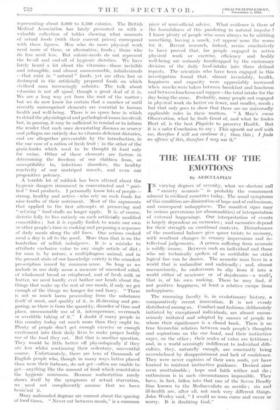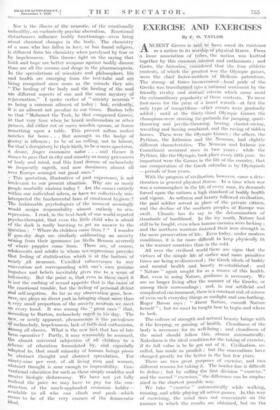THE HEALTH OF THE EMOTIONS .
By AESCULAPIAN
IN varying degrees of severity, what we -doctors call " anxiety neurosis " is probably the commonest ailment in civilised countries today. The usual symptoms of this conditionare diminution of hope and of enthusiasm, and consequent unhappiness. The manifest signs may be serious perversion's' (or abnormalities) of interpretation of external happenings. Our interpretation of events is largely dependent on memories ; and memories depend for their strength on emotional contexts. Disturbances of the emotional balance give queer twists to memory, with resultant changes in sensory impressions and in- tellectual judgements. A person suffering from neurosis is mildly insane. Between such an individual and those who are technically spoken of as certifiable no strict logical line can be drawn. The neurotic man lives in a world that is unfamiliar and unfriendly ; and, almost unconsciously, he endeavours to slip from it into a world either of nescience or of daydreams—a world, that is, of his own making. There he may find, if not positive happiness, at least -a relative escape from unhappiness.
The reasoning faculty is, in evolutionary history, a comparatively recent innovation. It '.iS ' not evenly distributed among us. Conduct and fashions, deliberately initiated by exceptional individuals, are almost uncon- sciously imitated and adopted by masses of people to whom their significance is a closed book. There is no true hierarchic relation between such people's thoughts and aspirations on the one hand, and their instinctive urges, on the other ; their scales of value are fictitious ;• and, in a world seemingly indifferent to individual diffi- culties, they, naturally enough, are constantly being overwhelmed by disappointment and lack of confidence. They were never captains of their own souls, yet have learned to mistrust instinctive guidance. Desired aims seem unattainable ; hope and faith wither and die ; enthuSiasm is in such circumstances impossible. They have, in fact, fallen into that one of the Seven Deadly' Sins known to the Mediaevalists as aecidie ; sin and ill-health are, after all, not such very different things.' John Wesley said, " I would as soon curse and swear as ' worry. y It is doubting God." Nor is the 'illness , of the neurotic, Of 'the'"ernotiOnally unhealthy, an exclusively psychic aberration. Emotional disturbances influence bodily functionings—even bring about chemical changes in the body. The chemistry of a man' who has fallen in love,. or has found religion, is different from his chemistry when paralysed by fear or :by hopelessness. This throws light on the saying that faith and hope arc better weapons against bodily disease than are all the serums and drugs in the pharmacopbeia. In the. speculations of scientists and philosophers, life and health are emerging from the test-tube and are being recognised once more as the miracle they are.; :"The healing of the- body and the healing of the soul are different aspects of one and the same mystery Of rejuvenation." I spoke earlier of " anxiety neurosis " 'as being a common ailment of today ; but, evidently; it is an ailment not peculiar to our times. Burton tells us that " Mahomet the Turk, he that conquered Greece; at that very time when ,he heard ambassadors or other 'princes, did either Cut or. Carve wOoden, spoons, or frame 'something upon a table. This present sultan makei notches foi. bows . . . But amongst us the badge of -gentry, is idleness ; to be of no calling, not to labour; for that's. derogatory, to their birth, to be a nacre„Spectator, a drone, filiges co. nsumere natus . . and thence it .domes to pass that in city and country so many grievances of body and mind, and this feral disease of melancholy 4,4) frequently rageth, and now domineers almost all over Europe amongst out great ones."
!,!L This quotation, illustrative of past experience, is riot irrelevant to 'our present situation. Why are so many 'people morbidly anxious today ? Are the causes entirely Within our individual delves, or have we collectively mis- interpreted the fundamental laws of emotional hygiene .? The fashionable psychologists of the moment seemingly Would - assign-- responsibility- —almost-- -entirely --to- -sex- repression. I read, in the text-book of one world-reputed Psycho-therapist, that even the little child who is afraid of the dark is 'really bursting to get an answer to the question': " Where-do children come from ? " I wonder if giin-shy dogs are similarly sublimating an anxiety arising from their ignorance' (as Stella Benson averred) Of Where puppies come from ' There are,':"of course, adolescents. and adults in Whom sex-repressions pro Vole that reeling of .itultificatieri Which is at the bottoth Of nearly all ,rienroseS, UnWilled subservienee to ,any convention, not corresponding with one's own genuine impulses and.- beliefs inevitably gives rise to a sense of inferioritY. But the point is that even in these cases it is not the". curbing of sexual appetite that is the cause of the emotional. trouble, but the feeling of personal defeat 'a'nd self-negation. So far as 'my observation goes, how- e(ver,. sex plays no direct partin hinging about more than kvery small proportion of the, anxiety .neurosis we meet on every hand. It was among the " great. ones " I hat, according to Burton, melancholy raged in his day. The oew, or newly apparent, phenomenon is the prevalence of melancholy, hopelessness,lack of faith and enthusiasm, among all classes. What is the new fact that has of late 1?een*operative ? Partly, it may reasonalily be assumed, the almo4 universal subjection of all children to a ,seherne of education 'formulated by,- and- especially adapted to, that small minority of human beings prone to abstract thought and abstract speculation. For ninety-nine per cent. of all living _men and women, abstract- thought is near enough to impossibility: Con- ventional education for such as these simply muddles and creates biologic disharmony. We have not yet fully realised the price we may have to pay for the con- struction of the much-applauded economic ladder— available to all who can climb and push—which seems to be of the very essence of the democratic ideal.



























































 Previous page
Previous page